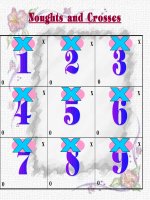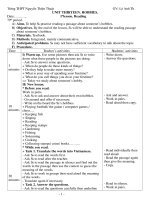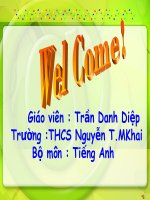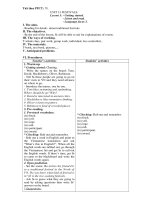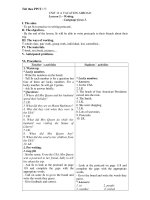unit 13: Hobbies-Readingg
Bạn đang xem bản rút gọn của tài liệu. Xem và tải ngay bản đầy đủ của tài liệu tại đây (345.87 KB, 12 trang )
LESSON PLAN
Unit 13: Hobbies
Reading
I. Class detail:
- Class: 11
- Number of students: 45
- Time allotted: 45 minutes
- Date: 10/12/2012
II. Objectives:
By the end of the lesson, students will be able to:
- Develop such reading micro-skills as scanning for specific ideas and
guessing meaning in context.
- Use the information they have read to discuss the related topic as well as
talk about their hobbies.
- Gain more knowledge about some kinds of hobbies.
- Use vocabulary items related to hobbies.
III. Skills
- Main skill: Reading
- Sub skills: Speaking, Listening
IV. Lexical items: accomplished, accompany, fish tank, avid, discarded.
V. Materials: textbook, blackboard, pictures, handouts.
VI: Anticipated problems:
- There maybe have some words that Ss do not understand.
- Some Ss will not understand when T gives the instructions in English.
- Time-limited: It is the end of period, but the lesson is not finished, there
are some activities which have not happened.
Solutions:
- T teaches some new words and instructs Ss to guess the meaning of other
new words based on the contexts.
- T gives instructions as clearly as possible and checks Ss’ understanding
carefully or T may use Vietnamese to clarify the instructions.
- T controls the time suitably for each activity.
VII. Procedure
Stages Activities Work
arrangement
WARM-UP
(5 mins)
Game: Remembering
T asks Ss to play a warm-up game
- T divides class into 2 teams: team A &
team B
- T gives instruction: “I’m going to show
you 8 pictures (appendix) of 8 activities;
you have 5 seconds to look at each
picture, remember what you can see. After
that, the representative of each team will
go to the black board and write down all
the activities that they can remember
beginning with V-ing in 1 minute. Which
team has more correct answers will be the
winner.”
- T checks instruction:
+ “How many pictures are there?”
+ “What are you going to do now?”
- T lets Ss play the game
- T checks the answers with the whole
class
- T congratulate the winner
Lead-in:
- T asks Ss:
+“When do you often do these
activities?”
Group work
Expected answer : in free time
+“What do you call the activities that
you often do in your free time?”
Expected answer: hobbies
T introduces the topic of the lesson:
“Hobbies”
PRE-
READING
(12 mins)
Activitiy1: Teaching vocabulary (7mins)
• T elicits some the useful vocabulary
one by one by many different
techniques and builds up them into a
list on the blackboard.
- Accomplished (adj) /ə'kɒmpli∫t/: có tài, tài
hoa, cừ khôi
Technique for eliciting: Synonym
T elicits by asking: “ What is another word
for talented or skilled”
Expected answer: accomplished
- Accompany (v) /ə'kʌmpəni/: đệm đàn, đệm
nhạc
Technique for eliciting: Picture
T shows a picture of a person who is
accompanying on the guitar and asks Ss:
“What is he doing?”
Expected answer: accompany
- Avid (adj) /'ævid/: khao khát, thèm thuồng
Technique for eliciting: Translation
T elicits by asking: How do we say the word
“khao khát” in English?
Expected answer: avid
- Fish tank (n) /fiʃ tæŋk/: bể cá
Technique for eliciting: Picture
T shows a picture of a fish tank and asks Ss:
“What is this?”
Expected answer: fish tank
- Discard (v) / dis’kɑ:d/: loại bỏ
Technique for eliciting: Situation
T explains: when something is old, and we do
not use it any more. What will we do with it?
(How do you call “loại bỏ” in English?)
Expected answer: discard
T – whole class
• After eliciting each word, T models 3
times and gets Ss to do choral. Then, T
calls Ss to repeat individually.
• T stresses syllables for each word.
• T asks Ss to copy down those words in
their notebooks
Activity 2: Checking vocabulary (5mins)
Technique for checking: Rub out and
remember
- T rubs out a word and asks Ss to say
the words out aloud including the
rubbed out word
- T rubs out other words and does the
same thing for each word.
- When all words are rubbed out, T asks
some Ss to come to black board and
write them down in the correct
position.
- T gives feedback
T- Students
WHILE-READING
(20mins)
Activity 1: T/F
statements (7mins)
- T prepares poster
- T gives instruction: “I
would like you to read the
passage on p. 147 and
decide whether these
statements are true or
false. You have 5 mins to
finish it”
- T checks instruction:
“What is your duty now?”
- T sticks the poster on the
black board
1. The most favorite
hobby of the writer
is playing the guitar
2. The writer admires
his uncle very
much.
3. The writer collected
Individually
fish from the shop
only.
4. The writer is an
avid stamp
collector.
5. The writer has more
foreign stamps than
local ones.
- T gives time for students
to read individually and
decide whether these
statements are true or false
- T asks Ss to give their
answers
- T checks their answers
and gives feedback
Key:
1. T
2. T
3. F
4. F
5. F
Activity 2: Multiple
choice (5mins)
- T prepares handouts
( Appendix 2)
- T gives instruction: “I
would like you to read the
text again and answer the
questions in handout by
choosing A, B, C or D.
You have 3 mins to do it.”
- T checks instruction:
“What are you going to
do, now?”
- T delivers handouts to Ss
- T gives time for students
to do the task
- T goes around as a
monitor for observing and
Individually
Group work
offering help if necessary.
- T calls on some Ss to
give the answers
- T checks with the whole
class and give feedback
Key:
1. D
2. B
3. A
4. D
5. C
Activity 3: Lucky stars
(8mins)
- T sticks the poster on the
black board
- T divides class into 2
teams: team A and team B
- T gives instruction:
“There are six stars on the
blackboard. Each team
will take turn to choose a
star and answer the
question. If your answer is
correct, you will get 1
mark. There are 2 lucky
stars and if you are lucky,
you will get 1 mark
without answering the
question, also, you will
have right to choose the
next star. Which team has
more correct answer will
be the winner.”
- T checks instruction
+How many stars are
there? (6).
+How many points will
you have if you get the
lucky coin? (1).
+How about an unlucky
star? (answer the question)
+And you will get? (1
point)
+If it is not a right
answer?(Other team will
answer)
- T lets Ss play the game.
Questions:
+Red star: What are the
writer's hobbies?
+Yellow star: Why does
the writer admire his
uncle?
+Black star: Lucky star
+Green star: How did he
collect the fish?
+Pink star: Which does
the writer get more of,
local or foreign stamps?
+Blue star: Lucky star
Key:
+Red star: The writer’s
hobbies are playing guitar,
keeping fish, keeping
stamps.
+Yellow star: Because he
is an accomplished
guitarist and he is very
good at accompanying
people singing with his
guitar.
+Green star: He collected
his fish by buying from
the shop and collecting
from the rice field near his
house
+Pink star: local stamps
- T checks the answers
with the whole class
- T congratulates the
winner
POST-
READING
( 7 mins)
Interview
- T prepares handouts
- T gives instruction: “I would like you to
work in pair. You will interview your partner
about his/her hobbies and then take note on
your handout in 3 mins and after that I will
call on you to report about your interview”
- T checks instruction:
+ Are you going to work in pair or group?
+ What are you going to do, now?
+How long will you interview?
- T elicits some structures used to interview
+What is your hobby?
+Why do you like it?
+When do you like doing it?
+Where do you often do it?
- T delivers handouts to Ss
- T gives time for students to do the task
- T goes around as a monitor for observing
and offering help if necessary.
- T calls on some Ss to report their interview
using information on their table
- T listens and checks mistakes with the
whole class.
Pair work
HOMEWOR T assigns Ss homework: T – whole class
K (1 min) - Learn by heart all new words.
- Write a short paragraph about your hobbies.
- Prepare for the next lesson.
Appendix 1
Pictures for warm-up game
Pictures for eliciting vocabulary
Appendix 2
1. The writer admires his uncle because he…
A. is an accomplished guitarist
B. can play a few simple tunes
C. is very good at accompanying people singing with his guitar
D. both A and C
2. The writer collects his stamps by…
A. buying from the post office
B. taking from the discarded envelopes that his relatives and his friends give
him
C. taking from his relatives
D. taking from his friends
3. With the less common stamps, the writer…
A. keeps inside a small album
B. gives away to other people
C. throws them away
D. none of the above
4. The writer collects his fish by…
A. buying from the shop
B. collecting from the rice field near his house
C. taking from his friends
D. both A and B
5. The hobbies make the writer…
A. busy
B. happy
C. occupied and glad
D. tired



